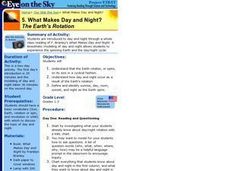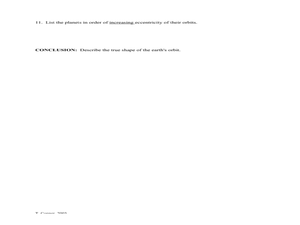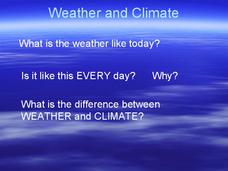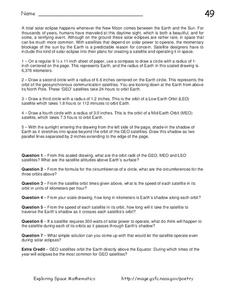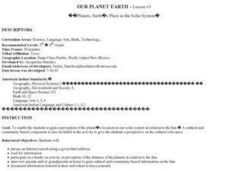Curated OER
Earth's Seasons
Sixth graders review the relationship between the Sun and the Earth. In groups, they use a globe and flashlights to show the shadows on the Earth during the different seasons. To end the lesson, they write in their journals about their...
Curated OER
The Sun
In this space science worksheet, students identify and name which gases make up the sun and the name of the part of the sun that we can see from Earth. Then they describe a solar eclipse and draw a diagram illustrating what happens...
T. Smith Publishing
Earth
Young astronomers read an informational text passage and then answer questions based on what they read.
It's About Time
The History and Scale of the Solar System
Take scientists beyond our earthly reach and into the solar system. Pupils create a model of the solar system and discuss strengths and weaknesses of their model. They calculate distances in light years, discuss the nebular theory, and...
NOAA
Satellite Communications
How do satellites communicate? What types of satellites orbit Earth? Discover and mimic the way satellites communicate between two points in a hands-on activity that has pupils using mirrors, flashlights, and marbles.
PBS
Why Do We Have Seasons?
Explore the reason for the seasons! An interactive lesson allows learners to explore the earth's rotation from the viewpoint of four cities at different latitudes. It provides descriptive information at eight points during the orbit...
Curated OER
Scale Activities
How do you put something as large as the universe in perspective? Use a series of scale experiments. Classmates collaborate around four experiments to examine the scale of the earth-moon system, our solar system, the Milky Way galaxy,...
Curated OER
How Far Away is SOHO?
Students create a scale model of the Earth and the sun that demonstrates where the SOHO satellite is in relation to the Earth.
Curated OER
How Does the Sun Affect the Earth?
In this sun worksheet, students brainstorm the different ways the sun affects the Earth. This worksheet is a graphic organizer.
Curated OER
What Makes Day and Night? The Earth's Rotation
Students discover that the Earth rotates on its axis in a cyclical fashion. They examine how this rotation results in day and night.
Curated OER
Heating the Earth
Middle schoolers explore how the angle of sunlight affects the Earth's temperature and seasons and then apply this understanding to their local situation.
Curated OER
Earth Turns? Prove It!
Learners construct a pendulum using a washer and thin fishing line. In this earth science instructional activity, students simulate Earth's rotation using the pendulum bob and swivel chair. They explain how this activity proves that the...
Curated OER
Our Solar System
In this space science worksheet, students use the clues at the bottom of the sheet to solve the crossword puzzle on our solar system. They identify the different planets and their location in relation to the sun.
Curated OER
Ellipse Lab
Leading the students to draw a representation of ellipses of planets, this handout will help understanding the planet movement around the sun. There are ten questions about the analysis of those orbits and a conclusino specifically...
Curated OER
Season Worksheet #5
Sunrise, sunset, swiftly fly the years! Your earth scientists can also fly through a year of daylight data. They analyze a graph and then answer five multiple choice questions about the rising and setting of the sun, the total number of...
Curated OER
The Planet Earth
Students explore the planet Earth, outer space, and Earth's axis. They demonstrate reading comprehension skills, including literal meaning, inference and critical analysis.
Curated OER
Modeling Martian Motion
Students explore the difference between stars and planets and take on the role of these objects to simulate the relative motions of Mars and the Earth around the Sun.
Curated OER
Astronomy Test
In this astronomy test, students answer 50 true/false and multiple choice questions about the relationships of the earth, moon, and sun. The test also includes questions about the solar system, galaxies, and the universe. An answer key...
Curated OER
A Lunar Transit of the Sun from Space
In this moon activity, students determine the angular size of the moon and draw a scaled model of the Earth, moon, and sun and given distances and positions. This activity has 4 problems to solve.
Curated OER
Weather and Climate
It's hot today, but is that the weather or the climate? This colorful presentation isolates both concepts to allow for better understanding by covering the positioning of the planet, making comparisons of land versus water, and looking...
Curated OER
Unit VIII: Worksheet 3 - Central Force
Beginning physicists imagine being aerospace engineers by solving seven centripetal force problems. They calculate the work, speed, time, and acceleration of objects in orbit: a satellite around Earth, and Earth around the sun. This is a...
Curated OER
Unit VIII Worksheet 5: Circular Motion
Seven problems send physics stars out of this world! Challenge learners to calculate centripetal force, time to complete revolutions, circular speed, and acceleration. They also are asked to explain scenarios and draw a force diagram for...
Curated OER
Solar Eclipse
In this solar eclipse worksheet, students solve seven problems about solar eclipses after making a model following five steps. They determine the different orbits for satellites, they determine the lengths of Earth's shadow and they find...
Curated OER
Earth's Place in the Solar System
Students study and discuss the planets. They create a visual representation of the layout of the solar system and color it. They also write an informative/narrative summary report on the cultural relevance of the Sun.











